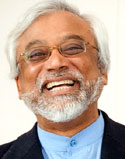Honouring The Earth: Several Chapters In The Holy Quran Open With An Oath Invoking Nature—‘By The Dawn’, ‘By The Fig And The Olive’

By
Jamal Rahman, New Age Islam
11 May 2021
Quran
Informs Us That God Has Appointed Human Beings As His Representatives On Earth
And Admonishes Us Not To Sow Corruption On Earth
Main
Points:
Rivers
flowing into the ocean and the branches of a tree swaying differently, but
connected at the level of the roots are a message of interfaith inclusivity.
We face
a grand crisis—the ecological crisis—and we bear an awesome responsibility.
There is
an urgent and critical need to heal Mother Earth.
Biggest
environmental problems are greed, selfishness and apathy.
-----
Today, we face
a grand crisis—the ecological crisis—and we bear an awesome responsibility.
There is an urgent and critical need to heal Mother Earth. The Quran informs us
that God has appointed human beings as His representatives on Earth and
admonishes us not to sow corruption on Earth. Furthermore, the holy Book
teaches that God has bestowed upon humankind a sacred trust. This is the trust
of awareness and free will. Using our awareness to make choices based on free
will, we must enjoin what is good and forbid what is evil. And yet we know that
in the last few centuries, and especially in the last few decades, human beings
have exploited, plundered and abused the Earth, Mother Nature.
I love the
words of a wonderful scientist, Gus Speth, who was an advisor to President
Carter on environmental issues in the White House. He said that for 30 years he
thought that the biggest environmental problems were the loss of biodiversity,
climate change and ecosystem collapse. For 30 years, as a scientist, he thought
that we could solve these problems with scientific advancements. But now, he
said, he had realized that the biggest environmental problems are greed,
selfishness and apathy. The ecological crisis, then, is actually a spiritual
problem and cannot be solved by scientists alone. The fact of the matter is
that all of us—each individual—has to do the inner work on ourselves that is
necessary to overcome greed, selfishness and apathy, that are at the root of
the ecological crisis.
Now, this
inner work is something we can do daily, setting aside some time for it. The
need to grow in higher consciousness is paramount. Spiritual teachers tell us
of a simple inner practice. We can keep Mother Earth in our heart for some
moments, and send out light and love in the course of our day to the polluted
rivers, to the trees, to the flowers, to the animals, and so on. This is no
insignificant matter. The vibrations of intentional love have an impact on
ourselves as well as on the environment. These teachers counsel us also to be
outwardly engaged. We can initiate or support programs for restoring balance,
harmony and love for Mother Earth. For instance, there is the popular project
of planting trees. The Prophet Muhammad is reported to have said, “If the Day
of Resurrection were established upon one of you while he has in his hand a
sapling, then let him plant it.”
Nature has
profound lessons to teach us. The Quran says that there are signs of God in
Nature. Dozens of verses in the holy Book extol Nature and several chapters
open with an oath invoking Nature—‘By the dawn’, ‘By the fig and the olive’.
The Quran teaches us that we will not find any flaws in Nature.
There are
many lessons for life that we can learn from this “holy manuscript” of nature.
Look at a fruit tree—it gives and gives, again and again—to everyone, without
distinction. This provides us a lesson in graciousness and hospitality.
Consider another example from Nature: the fact that all rivers flow into the
ocean is because the ocean lies at a level lower than that of the rivers. This
is a lesson in humility.
The 14th
century Persian poet Hafiz says that the Earth would die if the sun stopped
kissing it, and even after all this time the sun has never told the Earth that
it owes anything to it. See what happens with a love like that—it lights up the
entire sky! This is a lesson from Nature about unconditional love.
Consider
another example from Nature—this time, for a lesson in overcoming a false sense
of exclusivity—be it in the name of religion or something else. All the rivers flow
into the ocean. One might be floating down one river, but one must not mistake
the river for the ocean itself. Likewise, the branches of a tree may sway
differently, but they are all connected at the level of the roots—here is a
message of interfaith inclusivity.
May we all
truly look upon Nature as a holy manuscript and learn precious, life-giving
lessons from it!
----
Based in
the USA, Jamal Rahman is a popular speaker and author on Islam, Sufi
spirituality, and interfaith relations.
Along with his Interfaith Amigos, he has been featured in The New York
Times, CBS News, BBC, and various NPR programs.
Jamal is co-founder and Muslim Sufi Imam at Interfaith Community
Sanctuary and adjunct faculty at Seattle University. He travels nationally and internationally,
presenting at retreats and workshops.
Jamal’s passion lies in interfaith community building and activism.
URL: https://www.newageislam.com/islam-environment/earth-nature-dawn/d/124815
